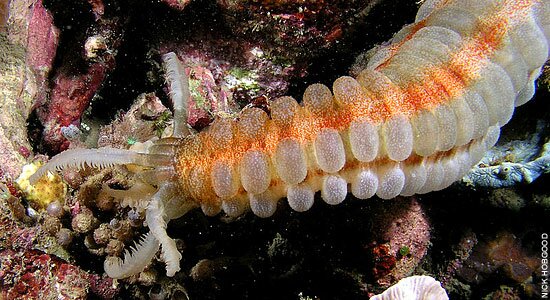The humble sea cucumber is under increasing threat worldwide, a new report warns.
- Sea cucumbers: a global review of fisheries and trade - UN FAO report
- UN FAO
Increasing demand for the cucumber – once a cheap and staple food of the poor, but now fashionable in expensive restaurants – is piling pressure on already depleted stocks.

Sea cucumber feeding at night off the Indonesian coast
The UN’s Food and Agriculture Organisation (FAO) warns in its report that sea cucumber populations across the globe, from Asia to the Galapagos, are in trouble and most high value commercial species are already depleted.
In a majority of countries looked at by the FAO and in the African and Indian Ocean regions, stocks are overfished. Similarly, in the Asian Pacific region the most sought-after species are largely depleted.
“The fast pace of development of sea cucumber fisheries to supply growing international demand is placing most fisheries and many sea cucumber species at risk,” according to the study “Sea Cucumbers: a global review of fisheries and trade”.
Sea cucumbers have long been used as a staple in soups, stews and stir-fries, and demand for the ubiquitous sea creature, which are actually echinoderms, continues to grow.
Countries like Indonesia, Papua New Guinea and the Philippines export large quantities to China and other Asian markets each year. Asia and the Pacific are the top sea cucumber producing areas, with total regional production between 20,000 and 40,000 tonnes per year.
However, Ecuador’s Galapagos Islands, the Seychelles in the Indian Ocean, and Newfoundland in Canada are also hotspots for production.
Sea cucumbers make an important contribution to the economies of coastal communities and in some places are the most economically important fishery and non-finfish export - highlighting the need to improve management and fishing practices.
But effective management plans for sea cucumber fisheries are rare, making it difficult to limit overfishing, the FAO report says. It also faces additional threats from global warming, habitat destruction, and illegal fishing.
Sea cucumber skins can be preserved by being boiled and smoked and then rehydrated later for use in cooking known as bêche-de-mer by the French.
The versatility of the creature is known in many countries. In Malaysia, they’re called trepang, in Japan, namako, and in the Philippines, balatan.
The Chinese poach them, smother them in a thick sauce of garlic, ginger, onion and soy sauce and call them hai sum.
Whole bêche-de-mer can be stuffed with a filling of pork, cornstarch and chopped fried fish.
Like their terrestrial namesakes, sea cucumbers can also be pickled.
In Spain up until 10 years ago they were considered worthless by Catalan fishermen who ate them on board as a snack but never landed them commercially.
But top chefs in Barcelona seized on them as a new and exciting food - espardenyes - which they cook quickly on a griddle and serve with olive, sea salt and a squeeze of lemon.
There is also an emerging market for the use of sea cucumbers in the pharmaceutical, cosmetic and food supplement industries.
The FAO report calls for sea cucumber management plans specific to local circumstances including measures such as establishing catch quotas and minimum size limits, closures during breeding seasons, and better monitoring of the status of stocks.
![]()



I’m glad you are highlighting the humble sea cucumber. It is a reminder that many other less glamorous species, from abalone to conch, are also in dire trouble from overfishing.
It may not be politically expedient or even politically correct, but much more pressure must be put on countries such as China and Japan to curb their voracious appetite for wild seafood if we are to have any chance of protecting what is left of our marine ecosystems.
In the Marshall Islands, such a comprehensive management plan for sustainable sea cucumber farming and harvesting has been developed in conjunction with the Environmental Protection Agency of the RMI. It is our hope that this model can be shared with other Small Island Developing States (SIDS) countries in the Pacific, to create a reliable supply of sea cucumbers for traditional consumption and biopharmaceutical extraction.